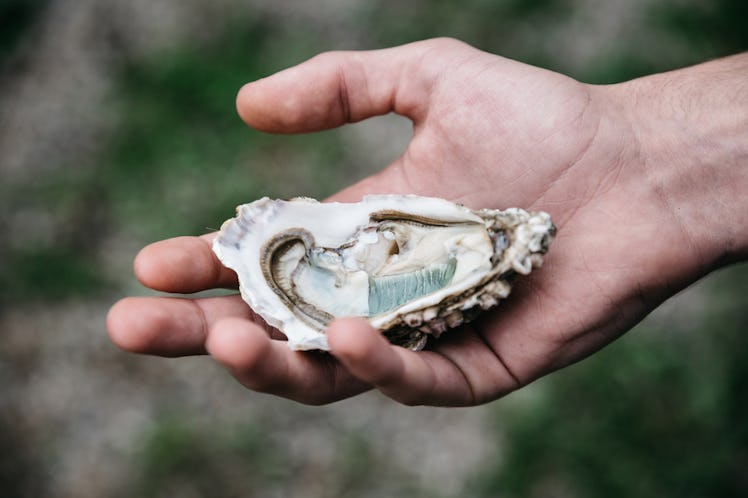It's hard to make it through a single day without coming across some kind of something that promises to amp up your sex life. Whether it's ads singing the praises of the newest pill to boost your sex drive, perfume made from pheromones that supposedly attract every member of the opposite sex within 200 feet, or just plain ol' oysters and chocolate, at one point or another you've likely found yourself wondering —do aphrodisiacs work? And while this may seem like a rather cut-and-dry question of whether or not downing a few oysters on Valentine's Day will have any impact on the sex to follow, just like pretty much everything else in life, unpacking the legitimacy of aphrodisiacs isn't black and white.
First off, let's take a sec to break out a dictionary and actually define the term "aphrodisiac." The word is derived from Aphrodite, the Greek goddess of love (insert heart emoji). By definition, an aphrodisiac is any "agent" (i.e., food, drug or scent) that stimulates or increases sexual desire.
From a purely scientific standpoint, there is pretty much no concrete evidence that proves there is a direct link between foods like chocolate and any measurable increase in sexual desire or sexual satisfaction. But (and there is quite a big but), the power of suggestion is a very real thing, and it just so happens to be one of the main things researchers use to explain the horny phenomenon that has felt real to humanity since as far backs as the Aztecs.
While the lack of science might make it easy to dismiss aphrodisiacs as total hoopla, according to WebMD, "Foods and the act of eating can suggest sex to the mind, which in turn can help stimulate desire in the body."
This means that even if foods like chocolate or oysters don't physiologically make you hornier, they might very well reap some enhanced sexual benefits.
So what about those "all-natural" arousal-enhancing penis pills that are pretty much always hanging out at bodega counters and gas stations everywhere?
According to the FDA, those supplements promising all kinds of crazy sexual super powers could actually be really dangerous. Some of them have been found to contain similar active ingredients as prescription drugs like Viagra. This might not seem like the worst thing, but there are actually many harmful interactions these active ingredients might have with other medications, which is why they require a prescription to begin with.
And last but not least, where does the forever-sensual sense of smell fall into all this? While we've all heard that someone's scent may have an impact on how attractive we find them (courtesy of our mammalian instincts), science has yet to prove that pheromones have any impact on the mating practices of humans.
Research has been able to support that sense of smell may illicit powerful emotions and memories linked to past experiences, which may very well explain why I still find Axe Body Spray to be kind of hot in an "Aw, you smell just like my first crush" kind of way. (His name was Vans (no joke) and he was bad.)
Needless to say, we still have much to learn about the science of sexuality and the ways in which we can tangibly enhance desire, but at the end of the day, science isn't everything. If eating a candy bar in bed with your bae makes you want to climb them like a tree, then by all means, continue.
Check out the entire Gen Why series and other videos on Facebook and the Bustle app across Apple TV, Roku, and Amazon Fire TV.
Check out the “Best of Elite Daily” stream in the Bustle App for more stories just like this!
